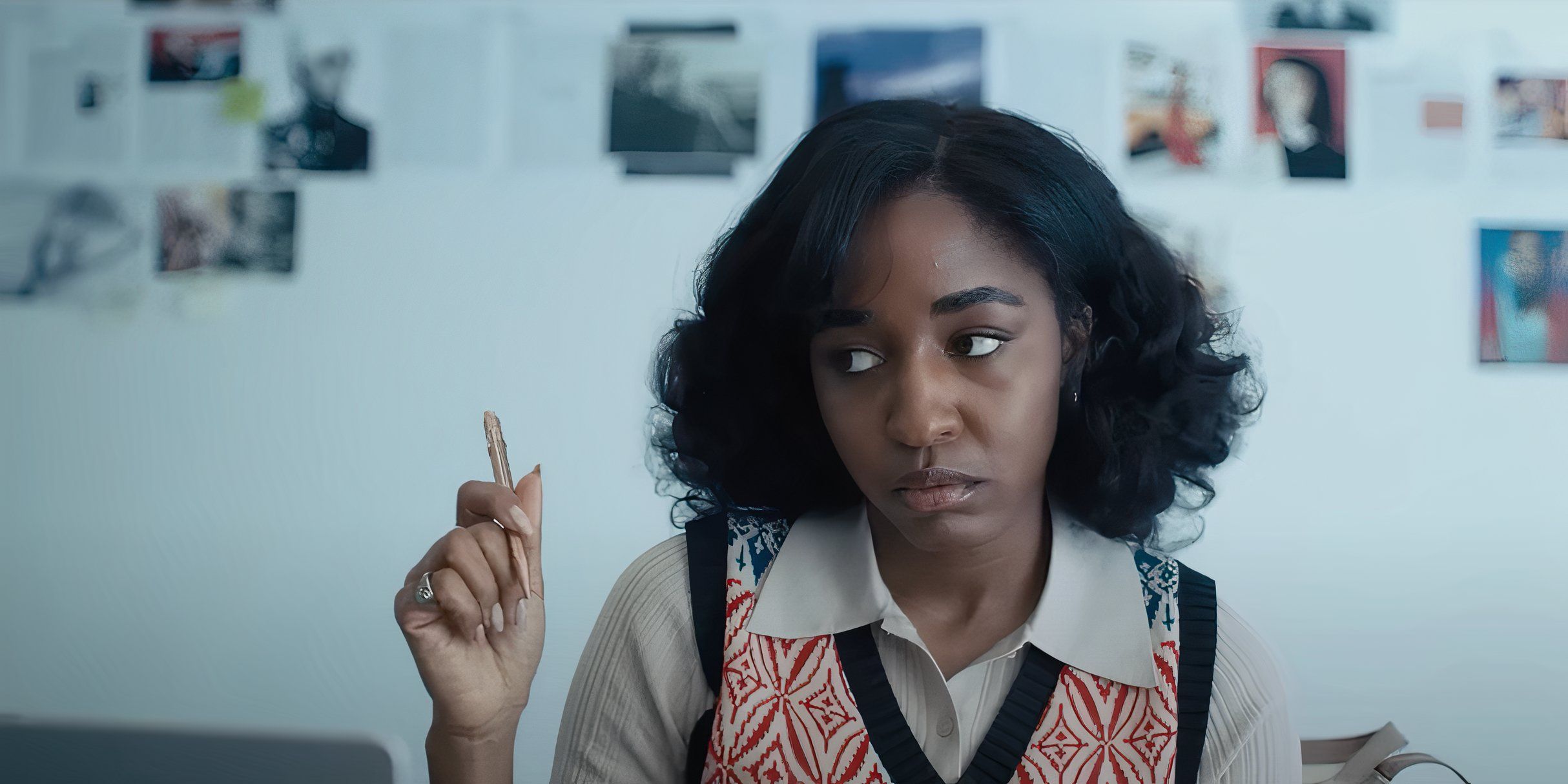When rumors start swirling, it's hard to separate fact from fiction. Ayo Edebiri, the talented actress known for her breakout role in "Succession," has recently found herself at the center of a storm due to false information spreading online. As the world watches, it’s crucial to understand the context and get to the truth. This isn’t just about one person; it’s about how misinformation can impact lives in a digital age.
Let’s face it, in today's world, rumors spread faster than wildfire, especially when it comes to celebrities. Ayo Edebiri, who has been making waves in Hollywood, is no stranger to the spotlight. But this time, the spotlight has turned into a spotlight on threats she’s facing due to unfounded rumors. We’re diving deep into what’s really going on and why this matters.
Before we get into the juicy details, let’s be clear: Ayo Edebiri is not just another face in the crowd. She’s a trailblazer in the entertainment industry, and her work speaks for itself. However, when false information starts spreading, it’s not just her reputation that’s at stake—it’s the safety of everyone involved. So, let’s break it down step by step.
Read also:Hd Hub4you Your Ultimate Destination For Highquality Entertainment
Who Is Ayo Edebiri? A Quick Bio
Ayo Edebiri is a name that’s quickly becoming synonymous with talent and determination in the entertainment world. Born on June 27, 1993, in Lagos, Nigeria, Ayo has always had a knack for storytelling. Her journey from Nigeria to the global stage is nothing short of inspiring. Here’s a quick snapshot of her life:
| Name | Ayo Edebiri |
|---|---|
| Date of Birth | June 27, 1993 |
| Place of Birth | Lagos, Nigeria |
| Occupation | Actress, Writer, Comedian |
| Known For | Role as Naomi in "Succession" |
Her career took off after landing the role of Naomi in the critically acclaimed series "Succession." Since then, she’s been a rising star, captivating audiences with her unique blend of humor and depth.
Understanding the Rumor: What’s the Deal?
So, what’s all the fuss about? The rumor in question revolves around a supposed controversy involving Ayo Edebiri. While details vary depending on the source, the core of the rumor paints her in a negative light. But here’s the thing—there’s no concrete evidence to back any of these claims. It’s all smoke and mirrors.
Let’s break it down:
- Rumors began circulating on social media platforms.
- They were picked up by some news outlets without proper verification.
- The lack of credible sources only adds to the confusion.
It’s important to remember that in the age of the internet, not everything you read is true. Verification is key, and that’s where we come in.
How Did the Rumor Start? Tracing the Source
Tracing the origin of a rumor can feel like chasing a ghost. In Ayo’s case, it seems to have started with a single tweet that went viral. The tweet made some bold claims about her personal life, which were quickly picked up by others. But here’s the kicker—none of it was verified.
Read also:Tamil Movies Download Your Ultimate Guide To Exploring The World Of Tamil Cinema
According to experts, this is a classic case of how misinformation spreads online. People share things without fact-checking, and before you know it, the rumor has legs. Social media platforms like Twitter and Instagram play a huge role in amplifying these kinds of stories.
Why Do Rumors Spread So Quickly?
There are a few reasons why rumors like this gain traction:
- They prey on people’s curiosity.
- They often contain sensational details that grab attention.
- They spread quickly because of the ease of sharing on social media.
It’s not just about the content—it’s about how it’s shared. A single click can send a rumor around the world in seconds.
The Impact on Ayo Edebiri: Threats and Beyond
Now, let’s talk about the real-world impact. Ayo Edebiri isn’t just dealing with hurt feelings; she’s facing threats because of these rumors. Threats that are serious enough to impact her personal safety and mental well-being. This isn’t just a problem for her—it’s a problem for all of us.
When false information leads to threats, it shows just how dangerous misinformation can be. It’s not just words on a screen; it’s real-life consequences. Ayo has spoken out about the toll this has taken on her, and it’s a powerful reminder of why we need to be more careful about what we share online.
What Can We Learn From This?
Here’s the lesson: before you share something, ask yourself if it’s true. Fact-checking isn’t just for journalists; it’s for everyone. By spreading false information, we’re contributing to a culture where threats and harassment become normalized.
How the Media Has Handled the Situation
The media plays a crucial role in shaping public perception. In this case, some outlets have handled the situation better than others. Reputable sources have taken the time to verify the facts and present a balanced view. Others, unfortunately, have contributed to the spread of misinformation.
According to a report by the Poynter Institute, responsible journalism is more important than ever. They emphasize the need for journalists to verify information before publishing. It’s not just about being first; it’s about being accurate.
What Makes a Source Trustworthy?
Here are a few things to look for when evaluating a source:
- Credibility: Does the source have a history of accurate reporting?
- Transparency: Do they disclose their methods and sources?
- Balance: Do they present multiple perspectives?
By using these criteria, you can better judge the reliability of the information you consume.
The Legal Implications: What’s Being Done?
When threats become serious, there are legal steps that can be taken. Ayo Edebiri has reportedly sought legal advice to address the situation. This includes filing complaints against those spreading false information and pursuing criminal charges if necessary.
According to data from the FBI, cyberstalking and online harassment are on the rise. Victims have legal recourse, and it’s important to know your rights. Ayo’s case highlights the need for stronger laws to protect individuals from online threats.
What Are Your Rights as a Victim?
If you find yourself in a similar situation, here’s what you can do:
- Document everything: Save screenshots and messages as evidence.
- Report it: Use the reporting tools available on social media platforms.
- Seek legal advice: Consult a lawyer who specializes in cyber law.
Remember, you’re not alone, and there are resources available to help you.
What Can We Do to Stop the Spread of Rumors?
Stopping the spread of rumors isn’t just the responsibility of the media—it’s everyone’s job. Here are a few things you can do:
- Fact-check before sharing: Use reputable fact-checking websites.
- Call out misinformation: Politely point out when something is false.
- Support the truth: Amplify voices that are sharing accurate information.
By taking these steps, we can create a more informed and compassionate online community.
The Importance of Digital Literacy
Digital literacy is more important than ever. It’s about understanding how information is created, shared, and consumed online. By improving our digital literacy, we can better navigate the complexities of the internet.
According to a study by the Common Sense Media, only 44% of teens can identify credible sources online. This highlights the need for education and awareness. We need to teach people how to think critically about the information they encounter.
How Can We Improve Digital Literacy?
Here are a few ideas:
- Integrate digital literacy into school curriculums.
- Provide resources for adults to learn about online safety.
- Encourage open discussions about misinformation.
By investing in digital literacy, we’re investing in a safer and more informed future.
Conclusion: The Bigger Picture
In conclusion, the situation surrounding Ayo Edebiri is a stark reminder of the dangers of misinformation. It’s not just about one person; it’s about the impact on all of us. By being more mindful of what we share and consume online, we can make a difference.
Here’s what we’ve learned:
- Rumors can have serious consequences.
- Fact-checking is crucial in today’s world.
- We all have a role to play in stopping the spread of misinformation.
So, the next time you see something online that seems too good—or bad—to be true, take a moment to verify it. Together, we can create a safer and more informed digital world.
Now, it’s your turn. Share your thoughts in the comments below. Have you ever been affected by misinformation? How do you combat it in your own life? Let’s start a conversation and make a change.
Table of Contents
- Who Is Ayo Edebiri? A Quick Bio
- Understanding the Rumor: What’s the Deal?
- How Did the Rumor Start? Tracing the Source
- The Impact on Ayo Edebiri: Threats and Beyond
- How the Media Has Handled the Situation
- The Legal Implications: What’s Being Done?
- What Can We Do to Stop the Spread of Rumors?
- The Importance of Digital Literacy
- Conclusion: The Bigger Picture

